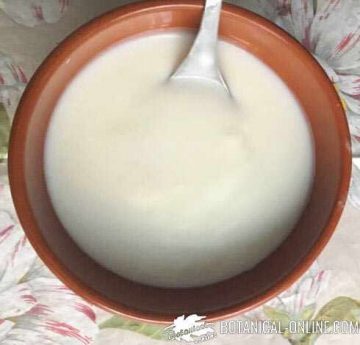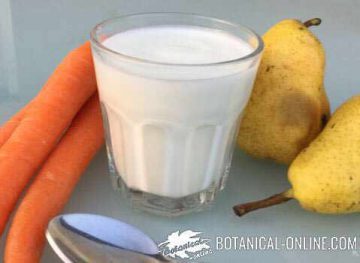Contents
Kefir as a medicinal food

The benefits of kefir are not only associated with its healthy microorganisms, but also with the presence of organic acids with beneficial properties for health. This is how, historically, numerous health-beneficial properties have been attributed to the consumption of kefir. For example, in Soviet countries, it was recommended for disease prevention.
The different components of kefir have demonstrated antitumor, antifungal, antibacterial, immunomodulatory, digestive mucosal protective, and anti-inflammatory properties.
Benefits of kefir
If we had to list the benefits of kefir, we would have to mention the following:
- This provides the nutrients found in milk and ferments: protein, vitamin B12, calcium, phosphorus, vitamin B6, vitamin K, etc.
- Probiotic effect
- Improves the composition of intestinal flora
- Helps fight infections such as Helicobacter pylori
- Lowers cholesterol
- Improves lactose intolerance
- Fights intestinal infections, fungi, and bacteria
- Shortens the duration of diarrhea
Probiotic properties of kefir

The natural agents of kefir are microorganisms that, due to their similarity, are considered to have probiotic effects very similar to those of yogurt. Between yogurt and kefir, the latter probably has added benefits by containing a greater variety of microorganisms. These microorganisms are usually from different families of lactic acid bacteria. Among them, the most important are Lactobacillus casei; fungi such as Saccharomyces cerevisiae yeast; and acid-loving bacteria such as Lactobacillus acidophilus.
Although the quantity of each type of microorganism contained in kefir is very difficult to determine, since it is subject to small variations depending on where it comes from and the modifications that the strains may have undergone, which have been passed from one person to another, it is estimated that the usual quantity of these microorganisms is usually around 400 million per gram of kefir, with approximately half of these being from the family of lactic bacteria.
The microorganisms with the greatest probiotic effect are those from the lactic acid bacteria family. Therefore, in addition to being the most common microorganism, they are also highly important nutritionally and are considered very beneficial for maintaining the correct health of our body. These bacteria act throughout the intestinal tract, producing protective mucus and promoting a good state of the colon and intestinal wall.
The intestinal mucosa is better protected, and the intestinal microflora, made up of beneficial microbes, is regenerated. All of this results in a decrease in the absorption of unwanted substances or microorganisms and, therefore, a greater ability to prevent infections.
Kefir improves tolerance to Helicobacter pylori treatment and helps eradicate this unwanted bacteria, which causes many cases of gastritis.
Kefir against Helicobacter pylori
Numerous scientific studies confirm that kefir has probiotic properties suitable for fighting Helicobacter pylori. Consuming 250 ml of kefir twice a day is considered an effective adjuvant in eradicating this bacteria, according to one of the most influential scientific entities in this field, the Gastrointestinal World Organization (GWO).
We remind you that H. pylori is associated with most cases of gastritis and gastroduodenal ulcers. Eating probiotic foods like kefir, along with appropriate treatment, eliminates this bacteria and promotes promotes the healing of ulcers.
- Kefir improves tolerance to Helicobacter pylori treatment and helps eradicate this unwanted bacteria, which causes many cases of gastritis.
Kefir to reduce cholesterol
Another of kefir’s great benefits is its property to lower cholesterol levels. Apparently, one might think that a food with cholesterol, like kefir (milk has cholesterol), would be contraindicated for people with high cholesterol. Nothing could be further from the truth.
Currently, many scientific studies are focused on investigating the benefits of fermented dairy products like kefir. It appears that this food lowers cholesterol by acting on different “fronts”, that is, at different points in the metabolism:
- Kefir reduces cholesterol absorption in the intestine
- Intestinal flora that lowers cholesterol: At least one gram of cholesterol reaches the intestine every day, from the diet and bile. In recent years, it has been shown that certain types of bacteria present in the microbiota (intestinal flora) are capable of degrading cholesterol.
- Prevents the production of cholesterol in the liver: The components of kefir would be absorbed, reaching the liver, where they inhibit endogenous cholesterol synthesis by blocking the HMG-CoA reductase enzyme. In other words, kefir acts by slowing down cholesterol through the same mechanism as statins (cholesterol medications). For this effect to be more potent, it’s best to consume kefir at night, which is when the cholesterol synthesis process takes place.
There are different strains of kefir. Those that appear to have the greatest cholesterol-lowering effects are Lactobacillus plantarum (“Tibetan kefir”).Of course, to obtain the benefits of kefir for cholesterol, it is necessary to have a proper diet for cholesterol. A lack of vegetables in your diet, consumption of products with additives, junk food, and artificial sweeteners weakens your gut flora and This reduces the benefits of the diet. Furthermore, consuming flour, refined sugars, and bad fats produces an increase triglycerides and cholesterol.
Kefir to improve digestion
It has been shown that kefir consumption, in addition to improving the composition of the consumer’s intestinal flora, also improves food digestion. In this sense, kefir is very useful for improving lactose tolerance. The bacteria contained in kefir are capable of breaking down lactose into lactic acid, preventing it from reaching the colon, which causes the well-known flatulence and intestinal discomfort. Therefore, fermented dairy consumption is suitable for people with lactose intolerance.
Kefir and its antimicrobial properties

The richness of microorganisms in kefir is a defense against pathogenic bacteria that can contaminate milk. It has been shown that the colony of microorganisms that inhabit kefir acts as a natural protection for milk against attack by pathogens such as Salmonella, Helicobacter, Shigella, Staphylococcus, Escherichia coli, Enterobacter aerogenes, Proteus vulgaris, Bacillus subtilis, Micrococcus luteus, Listeria monocytogenes, Streptococcus pyrogenes, Streptococcus faecalis, Fusarium graminearum, and even against fungi such as Candida albicans.
Furthermore, kefir consumption has been shown to improve gastroenteritis, likely by providing probiotics that help fight the microorganisms that cause the infection. Isolated strains of kefir (probiotic supplements) have accelerated the healing of colitis, a severe intestinal diarrhea caused by Clostridium difficile.
Kefir against cancer
Recent studies suggest that kefir may have a protective role against cancer. On the one hand, due to its immunomodulatory properties it contributes to the proper functioning of the immune system, which is responsible for detecting tumor cells. Secondly, kefir prevents the proliferation of cancer cells (antiproliferative properties). Specifically, it has been shown to have effects on cells that cause stomach cancer, colon adenocarcinoma, and breast cancer.
Kefir to heal wounds
For external use, kefir can be used as an antiseptic. However, its use is not recommended for deep wounds. It can be combined with other treatments such as aloe vera gel, thyme infusion, or rosemary water.
Kefir for milk allergy
People with cow’s milk protein allergies can benefit from the properties of kefir by using water kefir, with very similar benefits:
![]() More information on kefir and its derivatives
More information on kefir and its derivatives








